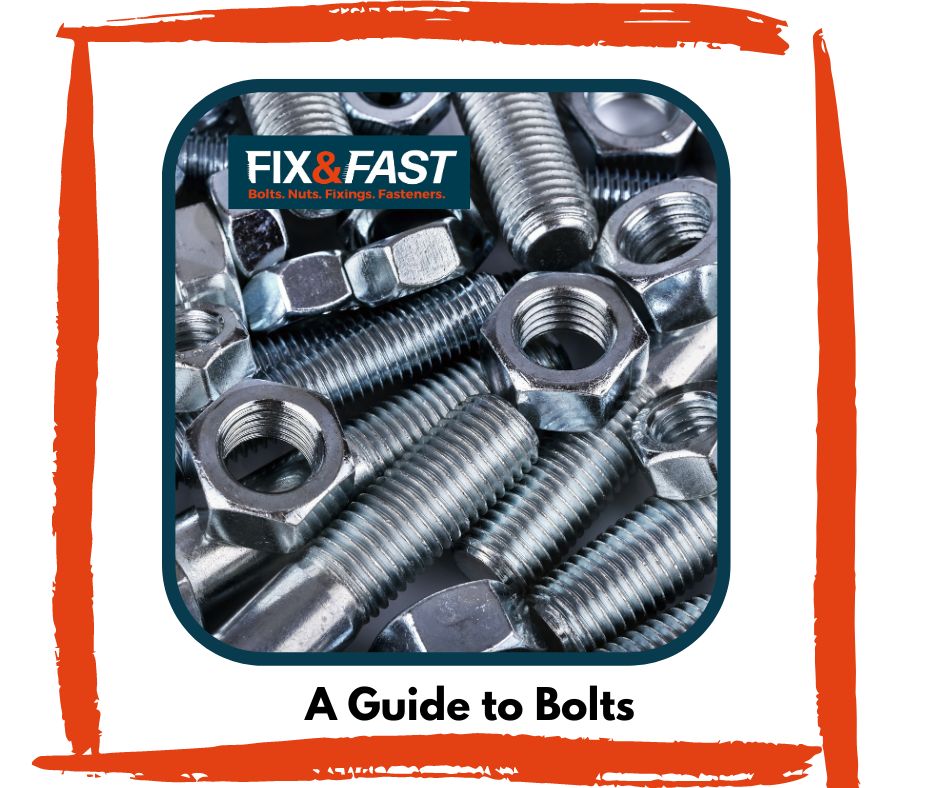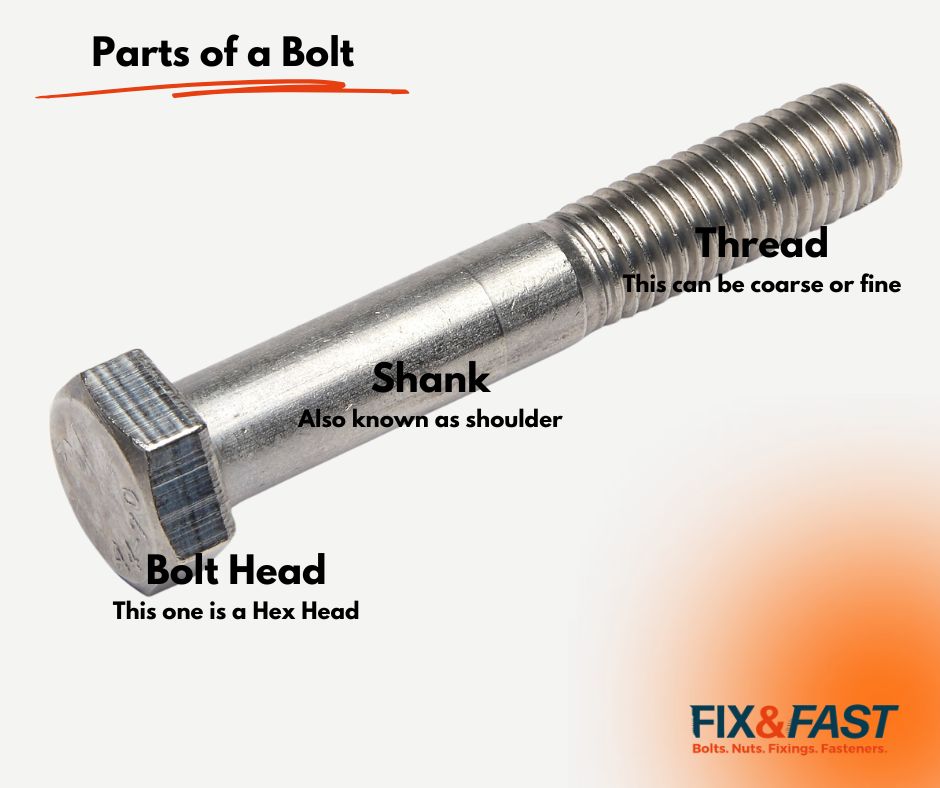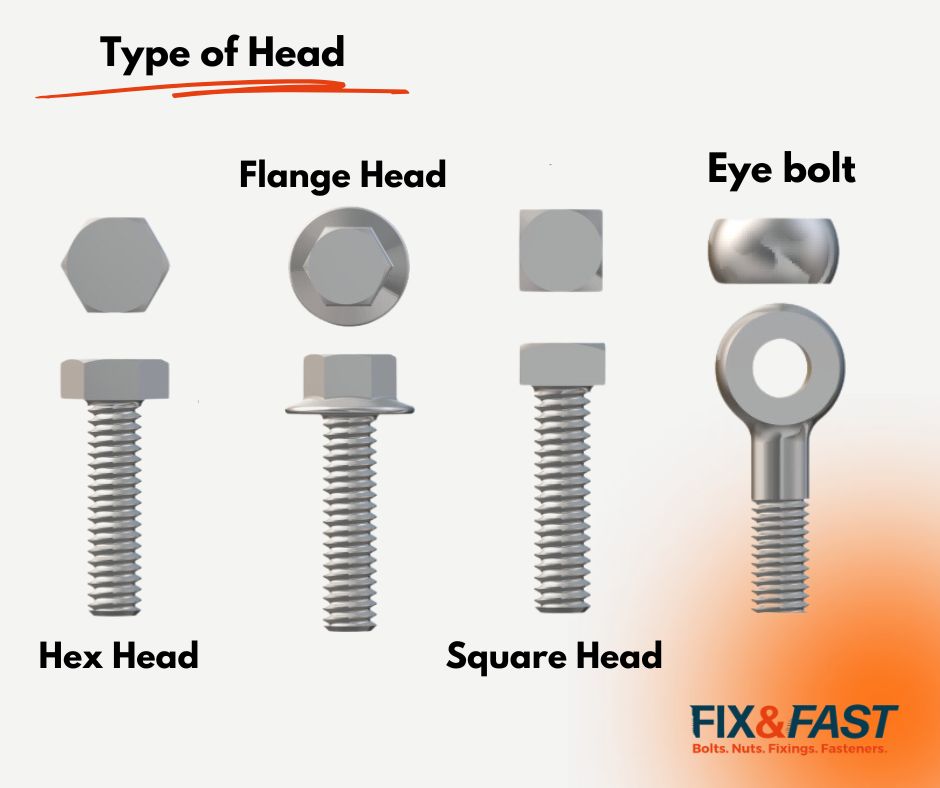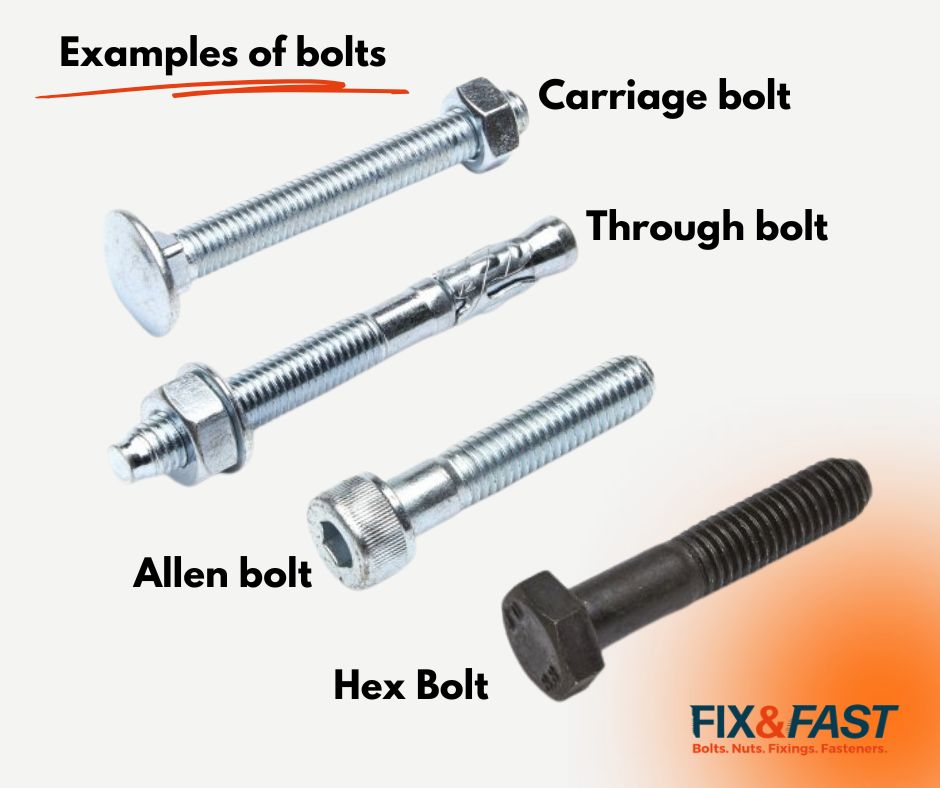What Are The Different Types Of Bolts And Their Uses?
When it comes to fastening and construction, bolts play a crucial role in ensuring structural integrity and durability. Understanding the various types of bolts and their specific uses can significantly enhance the quality and safety of your projects. This Fix and Fast guide will explore different types of bolts, their applications, and help explain some of the terminology around bolting such as bolt head type, hex bolt, and Allen bolt

Understanding Bolts: The Basics
Bolts are a type of fastener designed to secure objects together. Unlike screws, bolts require a nut or a tapped hole to function. The primary components of a bolt include the head, shank, and thread. The design and dimensions of these components determine the bolt's suitability for specific applications.

Types of Bolt Head
The head of a bolt is the top portion that is usually shaped to allow for tightening or loosening. The most common bolt head types include:
Hex Head: Featuring a hexagonal shape, hex bolts are one of the most versatile and widely used bolts. They are often employed in construction and machinery due to their strength and ease of use with standard wrenches.
Allen Head: Also known as socket head bolts, Allen bolts have a cylindrical head with an internal hex drive. These bolts are ideal for applications where a smooth, flush finish is needed, such as in furniture assembly and machinery with limited access space.
Square Head: Offering a larger surface area for tool contact, square head bolts are often used in older machinery and heavy-duty applications where high torque is required.
Flange Head: These bolts come with a built-in washer-like flange under the head, which distributes the load and prevents loosening. They are commonly used in automotive and industrial applications.
Button Head: With a low-profile dome shape, button head bolts are used in applications where a smooth, rounded appearance is desired, such as in furniture and decorative projects.

Types of Bolts and Their Uses
Hex bolts are perhaps the most common type of bolt, recognized by their six-sided heads. They are available in a variety of sizes and materials, making them suitable for a wide range of applications. Hex bolts are commonly used in construction, repair, and maintenance of buildings, bridges, and other structures due to their robustness and ease of installation with standard tools.
Allen bolts, or socket head bolts, are used when a clean, flush surface is necessary. Their internal hex drive allows for use in confined spaces where a conventional wrench might not fit. These bolts are prevalent in machinery, automotive, and furniture applications. The precision and neat finish of Allen bolts make them ideal for aesthetic and functional purposes.
Carriage bolts have a rounded head with a square neck that prevents the bolt from turning once it’s placed into a hole. These bolts are typically used in wood applications, such as securing wooden panels or furniture. The smooth, domed head provides a safe, snag-free surface.
Lag Bolts
Lag bolts, also known as lag screws or coach screws, are large, sturdy bolts with a hex head designed for heavy-duty fastening in wood. They are often used in construction projects such as deck building, securing heavy timber, and other woodworking applications that require significant holding power.
Eye Bolts
Eye bolts feature a looped head and are primarily used for lifting and securing cables or ropes. They are essential in rigging, marine, and construction industries where lifting and securing loads is a regular task.
Anchor bolts, or Through Bolts are used to attach structures to concrete. They are commonly employed in building construction, securing machinery to floors, and other applications requiring a strong anchor to a solid base. These bolts come in various designs, including L-shaped, double-end rods with plate, and swedge bolts, each offering different advantages depending on the specific use case.

Choosing the Right Bolt for Your Project
Selecting the appropriate bolt for your project depends on several factors:
Material: Bolts are made from various materials including steel, stainless steel, brass, and titanium. The choice of material affects the bolt’s strength, corrosion resistance, and suitability for specific environments.
Size and Length: The dimensions of the bolt must match the requirements of the application, ensuring a secure fit and adequate strength.
Thread Type: Coarse or fine threads can impact the bolt’s grip and resistance to loosening. Coarse threads are generally used in applications requiring quick assembly, while fine threads offer better holding strength.
Bolt Head Type: The head type affects the bolt’s performance and the tools required for installation. For example, hex bolts are easy to install with a wrench, while Allen bolts are better for confined spaces.
Where Can I Purchase Bolts
Bolts are indispensable in construction, machinery, and many other fields. Understanding the different types of bolts and their specific uses can ensure that you choose the right fastener for your project, enhancing both safety and durability. Whether you need a hex bolt for a construction project or an Allen bolt for a piece of furniture, knowing the characteristics and applications of each bolt type will help you achieve the best results.
For a huge range of bolts visit Fix and Fast. All our bolts are available in non box quantities, meaning if you only need a few you are not forced into buying a box of 100!. Our bolting experts are on hand to give advice when needed and we are rated excellent on trustpilot
Remember when buying to consider factors such as bolt head type, material, size, and thread type when selecting bolts. By doing so, you'll ensure that your projects are securely and efficiently fastened, providing long-lasting performance and reliability. For more advice on bolts give one of our fixing experts a call on 01482 324731







